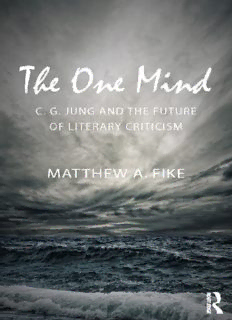
The One Mind: C. G. Jung and the future of literary criticism PDF
Preview The One Mind: C. G. Jung and the future of literary criticism
THE ONE MIND The One Mind: C. G. Jung and the future of literary criticism explores the implications of C. G. Jung’s unus mundus by applying his writings on the metaphysical, the paranormal, and the quantum to literature. As Jung knew, everything is connected because of its participation in universal consciousness, which encompasses all that is, including the collective unconscious. Matthew A. Fike argues that this principle of unity enables an approach in which psychic functioning is both a subject and a means of discovery—psi phenomena evoke the connections among the physical world, the psyche, and the spiritual realm. Applying the tools of Jungian literary criticism in new ways by expanding their scope and methodology, Fike discusses the works of Hawthorne, Milton, Shakespeare, Wordsworth, and lesser-known writers in terms of issues from psychology, parapsychology, and physics. Topics include the case for monism over materialism, altered states of consciousness, types of psychic functioning, UFOs, synchronicity, and space-time relativity. The One Mind examines Goodman Brown’s dream, Ad am’s vision in Paradise Lost, the dream sequence in “The Wanderer,” the role of metaphor in Robert A. Monroe’s metaphysical trilogy, Orfeo Angelucci’s work on UFOs, and the stolen boat episode in Wordsworth’s The Prelude. The book concludes with case studies on Robert Jordan and William Blake. Considered together, these readings bring us a signifi cant step closer to a unity of psychology, science, and spirituality. The One Mind illustrates how Jung’s writings contain the seeds of the future of literary criticism. Reaching beyond archetypal criticism and postmodern theoreti- cal approaches to Jung, Fike proposes a new school of Jungian literary criticism based on the unitary world that underpins the collective unconscious. This book will appeal to scholars of C. G. Jung as well as students and readers with an inter- est in psychoanalysis, literature, literary theory, and the history of ideas. Matthew A. Fike is a Professor of English at Winthrop University in Rock Hill, South Carolina, where he teaches courses in the human experience, critical thinking, Shakespeare, and Renaissance literature. This page intentionally left blank THE ONE MIND C. G. Jung and the future of literary criticism Matthew A. Fike First published 2014 by Routledge 27 Church Road, Hove, East Sussex BN3 2FA and by Routledge 711 Third Avenue, New York, NY 10017 Routledge is an imprint of the Taylor & Francis Group, an informa business © 2014 Matthew A. Fike The right of Matthew A. Fike to be identifi ed as author of this work has been asserted by him in accordance with sections 77 and 78 of the Copyright, Designs and Patents Act 1988. All rights reserved. No part of this book may be reprinted or reproduced or utilised in any form or by any electronic, mechanical, or other means, now known or hereafter invented, including photocopying and recording, or in any information storage or retrieval system, without permission in writing from the publishers. Trademark notice: Product or corporate names may be trademarks or registered trademarks, and are used only for identifi cation and explanation without intent to infringe. British Library Cataloguing in Publication Data A catalogue record for this book is available from the British Library Library of Congress Cataloging in Publication Data Fike, Matthew. The one mind : C. G. Jung and the future of literary criticism/Matthew A. Fike. pages cm Includes bibliographical references and index. 1. Literature—Psychology. 2. Jung, C. G. (Carl Gustav), 1875–1961. 3. Psychology and literature. 4. Jungian psychology. I. Title. PN56.P93F55 2014 809’.93353—dc23 2013012664 ISBN: 978-0-415-81974-9 (hbk) ISBN: 978-1-315-88620-6 (ebk) Typeset in Times New Roman by Refi neCatch Limited, Bungay, Sufolk FOR KINDNESS This page intentionally left blank Portions of some chapters of The One Mind: C. G. Jung and the Future of Literary Criticism draw from the following previously published materials. • Chapter 1: “We Are One Psyche: A Jungian Approach to Hawthorne’s ‘Young Goodman Brown,’” Postscript 27, no. 9 (2012): 1−20, www.pachome.org; and “The Literary Matrix of Loren Eiseley’s ‘The Secret of Life,’” The CEA Critic 72, no. 3 (2009): 17−36. • Chapter 2: Review of Thomas Campbell’s My Big TOE: A Trilogy Unifying Philosophy, Physics, and Metaphysics, TMI Focus 31, no. 3−4 (Summer/Fall 2009): 1−14. • Chapter 3: “‘The Wanderer’ and the Psychology of Sailing,” in Reading the Sea: New Essays on Sea Literature, ed. Kevin Alexander Boon (New York: Fort Schuyler, 1999), 77−99. • Chapter 4: “Thinking Metaphysically: The Challenge to Fundamentalism in the Works of Robert A. Monroe,” Peer English: The Journal of New Critical Thinking 3 (2008): 91−104. • Chapter 6: “Light at Midnight and the Art of Synchronicity,” Conversations in the Field 1, no. 7 (2010): 1−8, www.thejungiansociety.org. The editors/publishers of the pieces listed above have provided permission to include and adapt my earlier work as part of this book. In addition, Tor/Forge granted permission to quote from Robert Jordan’s New Spring and The Wheel of Time series, volumes 1−13, in chapter 8. This page intentionally left blank CONTENTS Acknowledgments xi In-text citations xii Introduction 1 1 A traditional approach to Hawthorne and the problem of materialism in Eiseley 19 2 Primordial consciousness: Transcendental monism in Milton’s Paradise Lost 35 3 Altered states: “The Wanderer” and the psychology of sailing 51 4 Out-of-body experience: Metaphor in Monroe’s metaphysical trilogy 68 5 UFOs: Dr. Jung versus Dr. Greer and the case of Orfeo M. Angelucci 81 6 Synchronicity: Wordsworth’s stolen boat episode in The Prelude 109 7 Remote viewing and channeling: The sonnets of Shakespeare and “Shakespeare” 122 8 Amplifi cation and quaternity in Robert Jordan’s The Wheel of Time series 143 ix
Description: